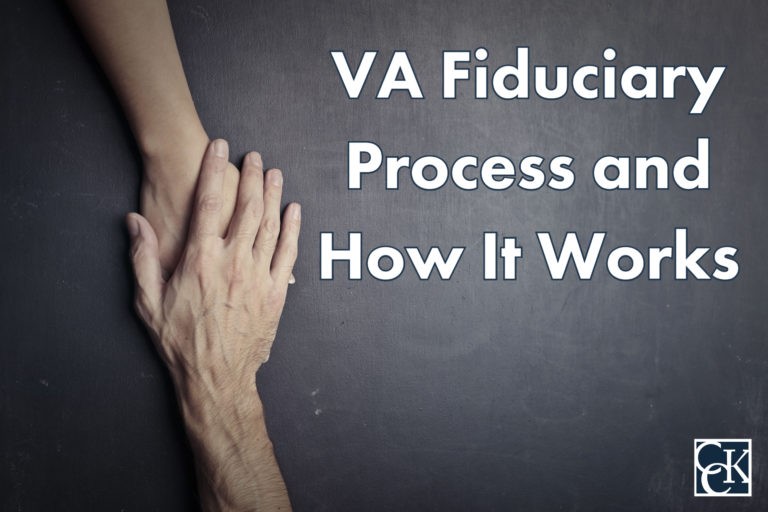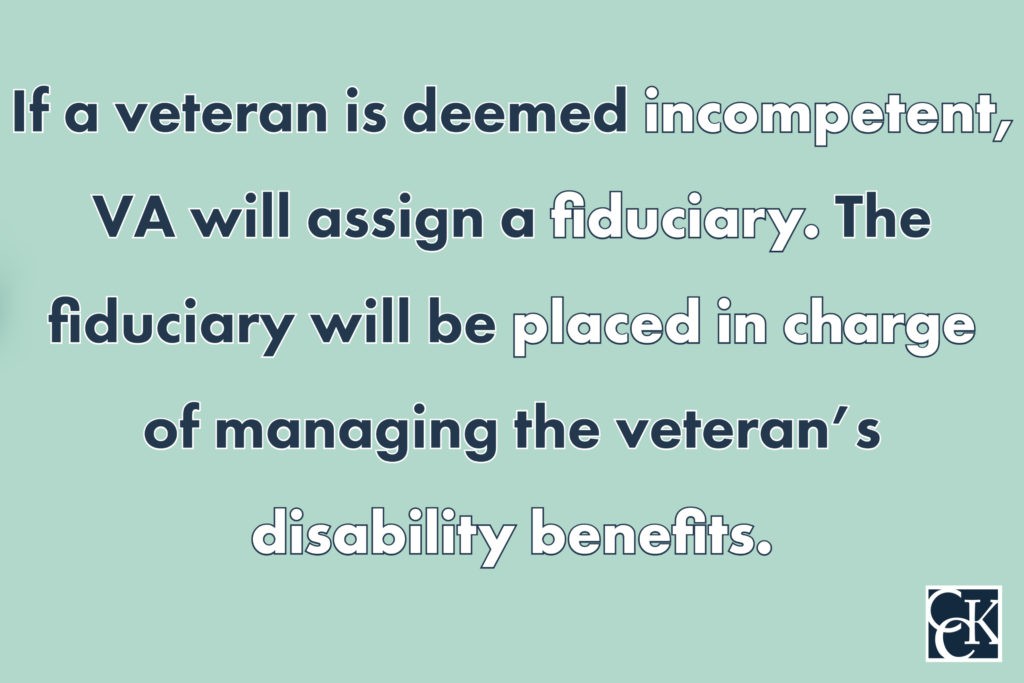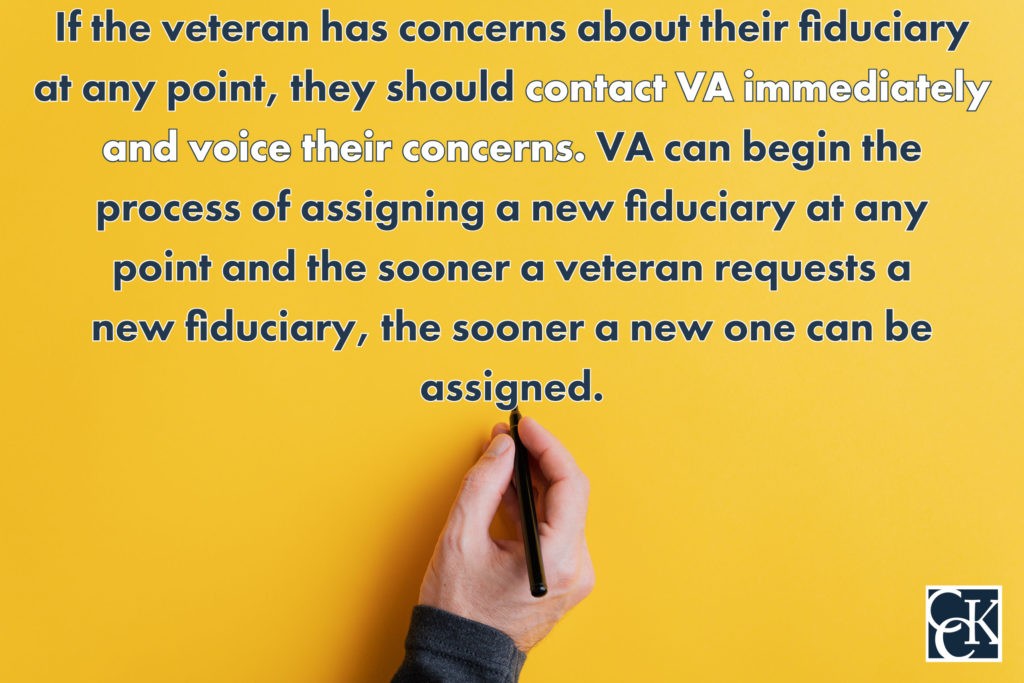VA Fiduciary Process and How It Works

CCK Law: Our Vital Role in Veterans Law
The fiduciary process exists for veterans who may be unable to manage their own VA disability benefits. Continue reading for a comprehensive look at the VA fiduciary process works, including how to choose a fiduciary and how to appeal incompetency.
What is a VA Fiduciary?
VA may determine that a veteran is incompetent and cannot manage their VA benefits. A veteran may be classified as incompetent due to their age or a mental disability. If a veteran is deemed incompetent, VA will assign a fiduciary. The fiduciary will be placed in charge of managing the veteran’s disability benefits.
The VA Fiduciary Process—Phase One: Incompetency
The fiduciary process begins once the question of incompetency arises. The most common time the question of incompetency arises is during a Compensation and Pension (C&P) exam. Specifically, a C&P exam may be performed if a veteran files a claim for an increased rating for a mental health condition.
During the exam, the examiner may raise the question of incompetency. The Disability Benefits Questionnaire (DBQ) for mental disorders contains a section that specifically addresses competency. As such, the examiner is instructed to ask the veteran about their capability of managing their own financial affairs. If the examiner notes that the veteran is not capable of managing their own financial affairs, they must provide some explanation as to why they have made that determination.
The examiner’s report can be very crucial in the incompetency determination. For example, if a veteran attends a C&P exam for a mental disorder and is asked about how they manage their finances, the veteran may say that a spouse generally handles the money and pays the bills. However, the examiner could infer from this statement that the veteran is unable to manage their finances, so they have delegated those responsibilities to their significant other. The examiner may conclude that, in the absence of their spouse, the veteran would be unable to handle their own finances.
What Happens Once Incompetency Is Raised?
Once a C&P examiner has indicated that a veteran may be considered incompetent, a rater from the Regional Office will issue a notice informing the veteran that incompetency has been proposed. The veteran will then have 30 days to respond.
When responding to a notice of proposed incompetency, a veteran may request a hearing, or submit evidence that the veteran should not be deemed incompetent. Once a request for a hearing has been submitted, there can be no further action taken until the hearing takes place.
If 60 days pass, and the veteran does not submit evidence or request a hearing, the rater at the Regional Office can finalize the decision determining the veteran to be incompetent. Importantly, this decision can be appealed. A decision can also be made after 60 days once the RO analyzes the evidence the veteran submitted or after a hearing has taken place.
How Are VA Disability Benefits Affected by an Incompetency Proposal?
Once incompetency is proposed, any retroactive benefits owed to the veteran are withheld until a decision is made regarding the veteran’s competency. The veteran will, however, still receive their monthly VA disability benefits check. The monthly benefits will reflect the veteran’s current disability rating.
To put this into context, if the veteran were granted a 100 percent rating for PTSD, but the issue of incompetency has been raised, the veteran will receive monthly checks reflecting the 100 percent rating, but will not receive any of the retroactive benefits until a decision has been made regarding the veteran’s competency.
If the veteran is deemed incompetent, the retroactive benefits will be paid to the fiduciary, once the fiduciary is appointed. If the veteran is deemed competent to manage their own finances, then the retroactive benefits will be paid to the veteran.
Phase Two: Appointing a Fiduciary
As mentioned above, a decision may be issued determining that the veteran is incompetent to manage their own finances. If this happens, the case then is sent to the Fiduciary Hub closest to where the veteran lives. There are only seven Fiduciary Hubs, meaning that multiple states will be assigned to the same Fiduciary Hub.
The Fiduciary Hub will work through the following process to assign the veteran a suitable fiduciary:
- Conducting an in-home visit with the veteran by a Field Examiner
- In-depth interview process with the veteran and with the proposed fiduciary candidate
- Investigation and background check into the proposed fiduciary candidate
- Installment of the fiduciary appointee when approved
- Determination of commissions
- Installment of safeguards for the veteran
What Does the Field Examiner Do?
One of the first steps in the fiduciary process is a home visit with a field examiner. The field examiner works for VA and is responsible for choosing a suitable fiduciary for the veteran, as well as supervising the fiduciary once chosen and ensuring that the fiduciary acts in compliance with VA. The field examiner will visit with the veteran in their home to assess their needs and determine how to best proceed with filling the fiduciary role.
For example, a home visit can help give the field examiner insight into the veteran’s lifestyle, finances, and healthcare needs. As such, it can be helpful for the veteran to have documentation prepared prior to the visit, specifically lists of expenditures, bills, and outstanding debts. The veteran may also wish to prepare a list or statement regarding how they plan to use their retroactive benefits once they are released to the fiduciary.
During the visit, the field examiner may make evaluations regarding the following:
- Physical status of the veteran, such as age, appearance, and physical disabilities or mobility limitations
- Mental health of the veteran, including any mental conditions, and ability to discern time, place, and events
- Current medications and specific health concerns
- Veteran’s current capacity to manage finances
- Inventory of assets
- Standard of living, with specific regard to the monthly finances and funds used
- Social adjustment, such as social relationships
- Industrial adjustment, such as work capability
- Dependents and needs of dependents
- Information regarding next of kin
- Any changes to benefit entitlement
In instances where the proposed fiduciary candidate is a family member, such as a spouse, the field examiner may schedule an interview with that person during the home visit.
How is the VA Fiduciary Chosen?
Generally, the most common types of fiduciaries are federal fiduciaries and court-appointed fiduciaries. Court-appointed fiduciaries are rarer and only used in instances where a federal fiduciary may not be found. A federal fiduciary can include:
- Spouses
- Family Members
- Legal Custodians
- Institutional award payee
- Office of an Indian reservation
- Custodian-in-fact
- Temporary fiduciary
As VA’s goal is finding the fiduciary who best suits the veteran’s needs, and, where feasible, preferences, VA has a set of guidelines to choose a fiduciary. VA’s internal handbook instructs field examiners to:
- “Determine the most effective, practical, and/or economical type of fiduciary appropriate to the situation;
- Discuss payee selection with the beneficiary to the extent possible; and
- Take into consideration the beneficiary’s request, where feasible.”
Field officers also examine the following information when determining the eligibility of a potential fiduciary candidate:
- Identification information, including name, address, date of birth
- Occupation status
- Relationship to the veteran
- Education level
- Credit report information (this is not necessary if the proposed fiduciary is a spouse or parent)
- Response to criminal background check inquiry
- Character witness statements
What Happens After the Fiduciary is Chosen?
After the field examiner completes the investigation into potential fiduciary candidate, they will make a determination. If the potential fiduciary candidate is appointed, the field examiner will notify the veteran through an official notification, similar to a Rating Decision. The field examiner will also likely call the veteran to discuss the decision on the phone, or in person in some cases.
If the fiduciary is a spouse, the spouse will receive a packet of paperwork by mail which will need to be filled out. If the fiduciary is someone other than a spouse, the veteran will be provided with the fiduciary’s identification information and a meeting will be scheduled for the veteran to meet with the new fiduciary in person. Once this meeting has occurred, the fiduciary will take over all financial responsibilities and obtain all the financial information necessary to do so.
How Do Veterans Get Rid of a Fiduciary?
The fiduciary process is designed to protect the veteran and their assets. As such, veterans have certain rights to ensure that the system is not abused and that the fiduciary is best suited for the veteran’s needs.
Such rights include the right to:
- Be notified when VA appoints a fiduciary
- Appeal the appointment of a fiduciary to the Board of Veterans’ Appeals (BVA)
- Request that VA replace a current fiduciary with a new fiduciary
- Be assigned a new fiduciary at any time
How to Avoid the VA Fiduciary Process
The best way to avoid the fiduciary process is to avoid the issue of incompetency being raised. As incompetency is most often raised at a Compensation and Pension Exam, once a claim for disability compensation has been applied for.
Usually the examiner will ask the veteran during their exam how they are able to manage their own finances. The veteran will need to very clearly state that they can manage their finances.
The examiner will write a report for VA after the exam and detail all answers the veteran provided. Any answers pertaining to finances or the veteran’s ability to manage their own finances will be included in the report. If the veteran mentions to the examiner that they need assistance managing their finances, the issue of incompetency may be raised.
Was Your VA Claim Denied?
If you find yourself in a situation where your claim has been denied, help is available. Contact our office today at 800-544-9144 for a free case evaluation to see if we can assist.
About the Author
Share this Post


